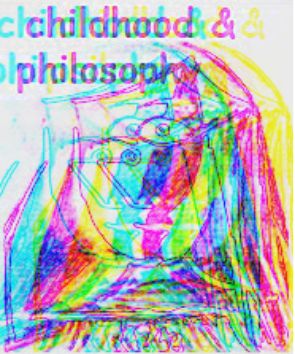os currículos da educação infantil e o problema da participação
DOI:
https://doi.org/10.12957/childphilo.2024.83325Parole chiave:
infância, currículo, participaçãoAbstract
O artigo trata da relação entre o processo de produção dos currículos na educação infantil e o problema acerca de como e por que a infância pode/deve participar ativamente de tal processo. Desenvolve-se mostrando a potência de se pensar a referida relação problemática desde um conceito de participação comprometido política e afirmativamente com a força da diferença, imanente aos encontros que o corpo infante traça com o mundo. Força esta que, de modo habitual, se desdobra nas experiências brincantes por meio das quais o ser da infância se concebe enquanto modo singular de subjetivação, no fluxo do fazer educador, inclusive. Utilizando-se da abordagem teórico-prática da Filosofia da Diferença, o ensaio produz um estudo acerca da necessidade de se promover exercitações curriculares de natureza qualitativamente diferencial para os processos de educação da infância; evidenciando, como resultado, possibilidades de se pensar o problema da participação para além da abordagem corriqueira/tradicional sugerida pela Base Nacional Comum Curricular (2018). Conclui que a ação de participar se configura como um artifício conceitual fundamental, uma vez que permite tecer movimentos curriculares mais potentes e efetivos ao acolher o próprio ser da infância, isto é, sua potência de diferenciação, como motor de propulsão no desenvolvimento do ato de educar.
Downloads
Riferimenti bibliografici
BRASIL. Ministério da Educação. Base Nacional Comum Curricular: educação é a base. Brasília, DF, 2018. Disponível em: http://basenacionalcomum.mec.gov.br/images/BNCC_EI_EF_110518_versaofinal_site.pdf. Acesso em: 20 abr. 2023.
CARVALHO, J. D. O problema da expressão em Deleuze e Spinoza. Revista Conatus – Filosofia de Spinoza, Fortaleza, v. 1, n. 2, p. 43-49, 2007.
DELEUZE, G.; PARNET, C. Conversações. Tradução de Peter Pal Pébart. São Paulo, SP: Brasiliense, 2005.
DELEUZE, G. Diálogos. Tradução de Eloísa de Araújo Ribeiro. São Paulo: Escuta, 1998.
DELEUZE, G.; GUATTARI, F. O que é a Filosofia? Tradução de Bento Prado Jr. e Alberto Alonso Muñoz. Rio de Janeiro: Ed. 34, 1992.
DELEUZE, G. A dobra: Leibniz e o Barroco. Tradução Luiz B. Orlandi. Campinas: Papirus, 1991.
GONÇALVES, C. B. V.; CARVALHO, J. M. Os códigos alfanuméricos da Base Nacional Comum Curricular para a educação infantil e as brincadeiras das crianças. Revista e-Curriculum, São Paulo, v. 19, n. 1, p. 219-240, 2021.
HADDAD, L. Tensões Universais Envolvendo a questão do currículo para a educação infantil. In: SANTOS, L. L. C. P. et al. (Orgs.). Convergências e tensões no campo da formação e trabalho docente. Belo Horizonte: Autêntica, 2010. p. 418-437.
HEIDEGGER, M.. Ser e Tempo. Petrópolis: Vozes, 2006.
KOHAN, W. O. (Org.). Lugares da infância: filosofia. Rio de Janeiro: DP&A, 2004.
LOPES, S. W. O currículo, a infância e o tempo. In: CARVALHO, J. M.; SILVA, S. K.; DELBONI, T. M. Z. G. F. (Orgs.). Currículos e Artistagens: políticas, ética e estética para uma educação inventiva. Curitiba: CRV, 2022a. p. 93-104.
LOPES, S. W. O currículo da educação infantil e os campos de experiência. Revista Espaço do Currículo, v. 15, n. 3, p. 1–9, 2022b. DOI: 10.15687/rec.v15i3.64682. Disponível em: https://periodicos.ufpb.br/index.php/rec/article/view/64682/37713. Acesso em: 5 abr. 2024.
ROLNIK, S. Cartografia sentimental transformações contemporâneas do desejo. Porto Alegre: Sulina, 2006.



